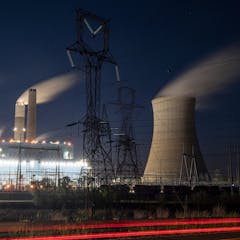
Articles on Fossil fuels
Displaying 81 - 100 of 643 articles

The 142 fossil fuel producers collectively exceeded the limits on coal, gas and oil production required to achieve the Paris Agreement goals by between 63% and 70%.

A pipeline that has carried Canadian oil and gas across Wisconsin and Michigan for 70 years has become a symbol of fossil fuel politics and a test of local regulatory power.

The case hinged on Montana’s ‘green amendment,’ which guarantees a constitutional right to ‘a clean and healthful environment.’ Other states have similar amendments, and more are considering them.

The last time methane in the air rose so fast, Greenland warmed by 10°C within decades.

We’re having a big impact on the planet. But what marks will we leave behind in deep time?

Climate change is ramping up, and with it, so is the rhetoric for action. It’s a fine line to walk between sounding the alarm and being accused of alarmism.

More than a century of research shows that burning fossil fuels warms the climate – that’s exactly why granting new North Sea oil and gas licenses is a bad idea.

Incrementalism and politics as usual cannot save the Barrier Reef from the largest threat it faces – the heat ramping up from climate change

International shipping is a big contributor to climate change, and it doesn’t change quickly, but its companies are starting to invest in cleaner fuels.

In the late 1980s, well diggers in Mali struck a rich source of naturally-created hydrogen. Now prospectors are scouring South Australia, looking for natural hydrogen.

Keir Starmer pledges to end new UK oil and gas exploration – an expert’s take on why this is the right move.

Nigeria’s new President Bola Ahmed Tinubu faces a number of challenges. But climate change cannot be ignored.

Labour would still honour existing licenses to drill for fossil fuels.

If greenhouse gas emissions continue at a high rate, breadbaskets of Europe and North America will see a 50% chance of a flash drought each year by the end of this century.

Energy firms are likely to lie about their corporate social responsibility to the environment. Their deception can be turned around for good if they are held accountable.

To address the climate crisis, governments need to limit new fossil fuel developments. But foreign investors are often protected under trade and investment agreements.

Fossil fuel power plants can avoid most emissions by capturing carbon dioxide and pumping it underground. But to be a climate solution, that carbon has to stay stored for thousands of years.

How to be more a more eco-friendly parent – it’s not as simple as ditching disposable nappies.

After the Supreme Court overturned the Obama administration’s strategy for reducing power plant carbon emissions in 2022, the Biden administration is taking a narrower but still ambitious approach.

Hydrogen is getting a lot of attention as the EPA prepares to propose new emissions rules for power plants. But it has a problem: almost all of it used today is made from fossil fuels.
